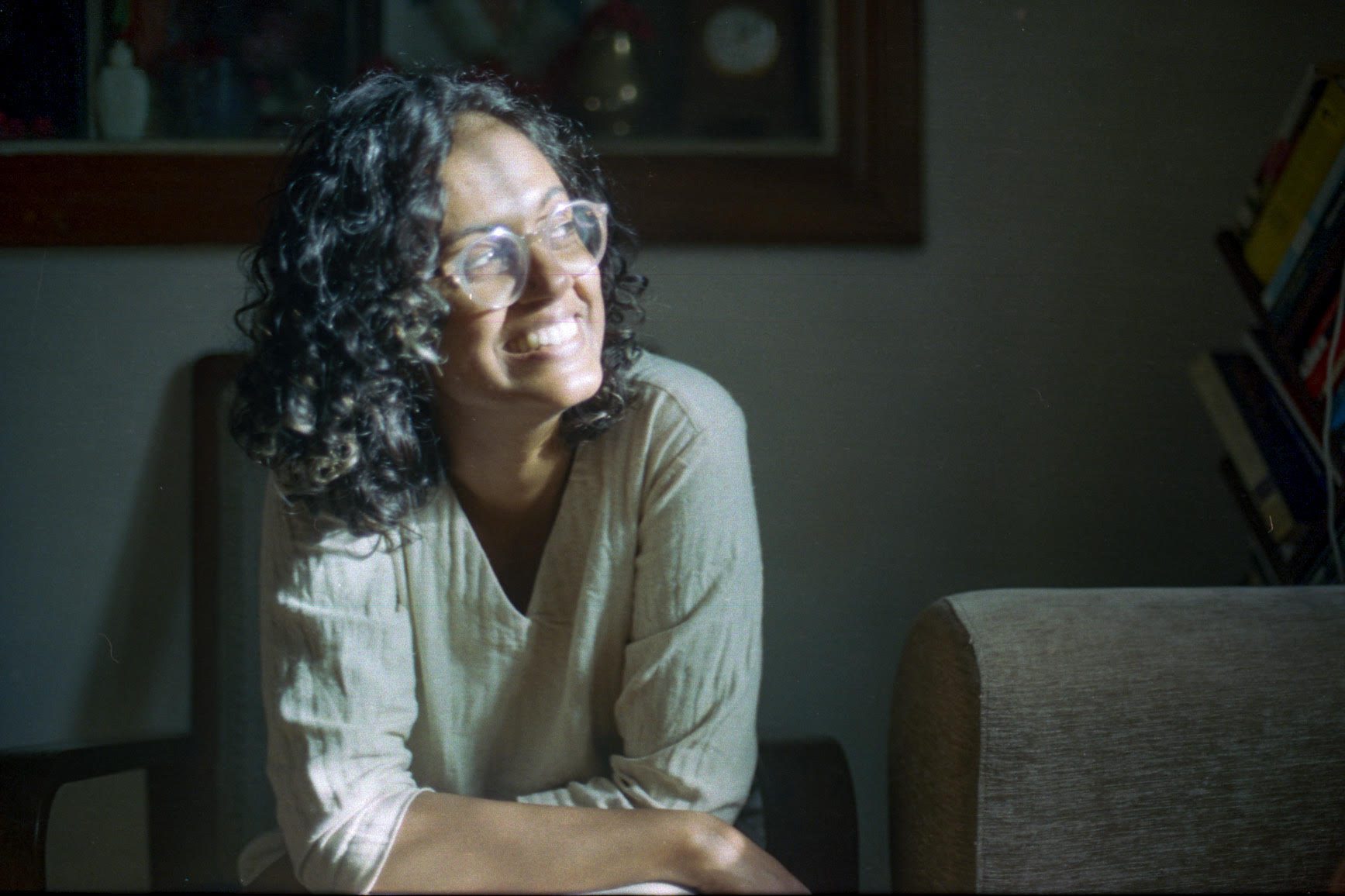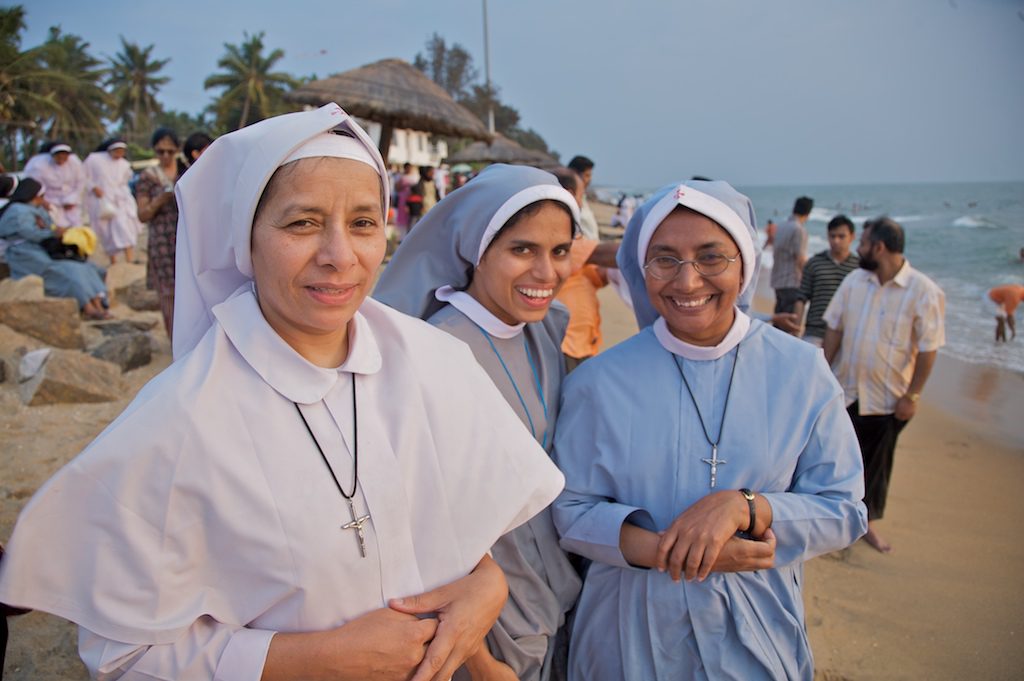This fall the Mittal Institute welcomed Anu Kottemkerry Antony as the new Raghunathan Family Fellow. Anu is a researcher whose scholarship focuses on the themes of subjectivity, women’s religious life and labor, everyday religiosity, and post-secular discourses in the context of Indian Christianity. She is formerly a visiting faculty member at the Tata Institute of Social Sciences (TISS), Tuljapur, India, and she shared what she looks forward to for her upcoming year at Harvard.

Anu K. Antony.
Mittal Institute: Anu, can you tell our readers where you hail from, and why you initially decided to apply for the Mittal Institute fellowship program?
Anu K Antony: I am from a small town called Nedumbasserry in Kerala, India. I completed my schooling and Bachelor’s degree from Kerala and moved to University of Hyderabad to pursue my Master’s degree. My Ph.D is from the Department of Humanities and Social Sciences, Indian Institute of Technology, Bombay.
The Mittal Institute fellowship is a wonderful opportunity for anyone who wants to continue their research after their Ph.D. In my case, I am trying to convert my Ph.D dissertation into a monograph and this fellowship is a great avenue to start working towards that. The Mittal South Asia Institute, with its location at the intellectually vibrant Harvard University, offers a crucial platform for scholars of South Asia to interact with the academic community from different regions of the world, facilitating collaborations and discussions of various sort.
Mittal Institute: Much of your research focuses on the anthropology of Christianity and Catholicism. Can you give a brief overview of your work? What drew you to this field of study?
Anu K Antony: My research explores the everyday lives of nuns belonging to the indigenous Syrian Catholic congregations of Kerala. Using a methodology that combines archival and ethnographic data, I try to understand various aspects of a nun’s vocation through the narratives of her calling, prayer, work, negotiation, submission, dissent, migration and so on. The attempt is to bring out the complex relationship between female religious ‘subject’ and institutional disciplinary regimes and to understand the centrality of her call and subjectivity in her reflective self-constitution as a ‘free’ religious subject. This also opens up to the crucial differentiation between the concepts of ‘agency’ and ‘freedom’ and how a nun’s subjectivity fashions an ethic of work, which I refer to as ‘spiritual labour’ in my dissertation.
The female Catholic congregations and their institutions have an active presence in Kerala. In fact, their institutions, especially schools, occupy a central space in the educational sphere of Kerala. At the same time, very interestingly, it is extremely difficult to find popular/mainstream literature that discusses a religious woman’s life and work seriously in the context of south India. If we keep aside the hagiographic and autobiographical literature, the nuns and their institutions have figured in the discussions of Malayali public sphere mostly in the context of different controversies regarding the congregations and the Catholic church. While it is important to discuss these controversies, an almost complete absence of literature on the everyday aspects of contemporary Catholic religious women’s agency, life and work limits us in exploring the historical and contemporary social realities of the region from a critical point of view. When you look at the history of the region, one can see that Catholic female congregations have a considerable role in the field of health care and young women’s education. It is to be acknowledged that the Protestant missionaries were the pioneers in this, but, from the early 20th century onwards, one can see that the Catholic nuns actively engage with the public sphere of Kerala through their different institutions. However, regardless of their existence and presence as professional women—hospital administrators, teachers, nurses, doctors, school principals, care workers, social workers, lawyers—their labor is rarely understood as one of the factors that contribute towards Kerala’s modernity or development. Moreover, the nuns are invariably portrayed as silenced and exploited figures forced to spent their lives in enclosures. There is a serious dearth of discussions about their agency, call, freedom, discernment and labor and I think it is important to study these minority religious institutions and the labor of women who are part of it both historically and sociologically, which in turn, becomes crucial in understanding the region better.
I think it is important to study these minority religious institutions and the labor of women who are part of it both historically and sociologically, which in turn, becomes crucial in understanding the region better.
To answer what drew me to this study, I should say that a number of things actually contributed to it. The familiarity with Catholic nuns and their institutions during my childhood and growing up years definitely is one of the reasons. One of the earliest points where I started to consider looking into the labor of Catholic nuns as a serious research interest was during my M.Phil program. I was studying the space of a Catholic convent school to understand how the categories of ‘secular’ and ‘religious’ plays out in the context of a minority institution. As part of this, I conducted fieldwork in a school owned by a Carmelite congregation and the interactions with certain Muslim parents whose children were studying in that school alerted me to a set of questions. These Muslim parents had expressed their differences regarding the school’s policy by which the Muslim students were not allowed to wear hijab within the school compound. Certain Muslim organisations also raised this issue and the parents had a discussion regarding this with the school’s management. The school management was not willing to compromise and the Muslim parents had to comply with the policy. In an interview following this discussion, the parents told me they were not transferring their children to another school because the quality and discipline that was assured here at an affordable fee was not available anywhere else. Also, the convent school is a place where only young women and female teachers are present, which makes the act of not wearing a hijab within the school campus a somewhat acceptable compromise for the Muslim parents.
Though at that point, these issues were interesting to me primarily for the questions it raised within the ‘Anthropology of Secular’; for instance, I pondered about the different types of headscarves that existed in the same space (the Muslim hijab, the nun’s veil and the Catholic girl’s headscarf mandated by the school for the first Friday mass in the school chapel). At the same time, this made me think about the mission of nuns through a sociological framework, which led to a further question – why is there such a high demand for convent education in Kerala, or any serviceprovided by the nuns for that matter? What makes the institutions owned by religious orders and run by the nuns, especially their schools, such sought-after places? Apart from the questions of ‘trust’ placed on the nuns with regard to young women’s moral, disciplinary and educational formation, I was fascinated by the fact that there is a particular ethic of work that is at play here, which is primarily structured by and deeply rooted in a reformative Catholic philosophy of labor, which I believe needs more detailed attention. It is worth examining more closely the nuns’ vocation, everyday lives and most importantly, their professional lives and the ethic of work referred to here as ‘spiritual labor’.

Nuns at Cherai beach, just north of Kochi, Kerala, South India | By Michael Foley.
Mittal Institute: How did you narrow in on a specific focus on Kerala?
Anu K Antony: I am from Kerala, and I have a pretty good grip on the language, which is very important both to conduct the ethnography as well as to read and analyze the archival materials. Familiarity to the cultural context also helps one understand the complex social situations and realities in a more detailed manner. I think it is important to understand the religious institutions more closely and seriously since the Indian society should be seen as mostly religious and one where religion has an impact at different levels and depths. As I mentioned earlier, when you look at the contemporary Malayali society historically, one can see that various religious institutions, including the Catholic Christian institutions and the gendered labour in these spaces, has a story to tell.
Mittal Institute: What is the project you will focus on while here in Cambridge?
Anu K Antony: I am working towards developing my Ph.D thesis into a monograph. I will be mostly working on the manuscript this year. I am very grateful that I am under the expert mentorship of Prof. Francis X Clooney, a professor at the Harvard Divinity School who has done a significant amount of work on South Asian religions. The engagement with him is going to be beneficial for my research.
Mittal Institute: What has been your favorite aspect of life at Harvard thus far?
Anu K Antony: I am totally enjoying my time here. I love the fact that there is some academic event happening every other day which keeps me updated and in the loop of contemporary social science discussions. The campus, the resources, especially libraries in Harvard are amazing!
Mittal Institute: What are your career goals, as you think ahead post-fellowship?
Anu K Antony: In terms of research, I would love to explore more on the trans-national migration of Malayali nuns for religious labour and the flow of this labor across the globe through the networks of Catholic church. I am also interested in looking at the Christian-Muslim everyday engagements in the context of South India. In terms of job, I am in the process of applying for academic positions both in India and universities outside India.
Anu K. Antony’s recent publications:
Antony, A. K., & Robinson, R. (2023). Prayer as an actant: Freedom and sociality in the subject formation of a Catholic nun in Kerala, South India. Social Compass, 70(2), 169-186.
Antony, A. K., & Robinson, R. (2023). Called to God: Event, Narration and Subject Formation in the Vocation of a Catholic Nun. Critical Research on Religion, 11(1), 33-47.
